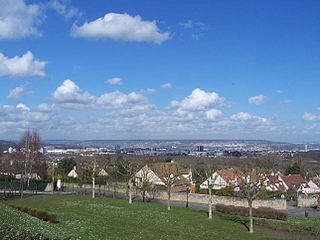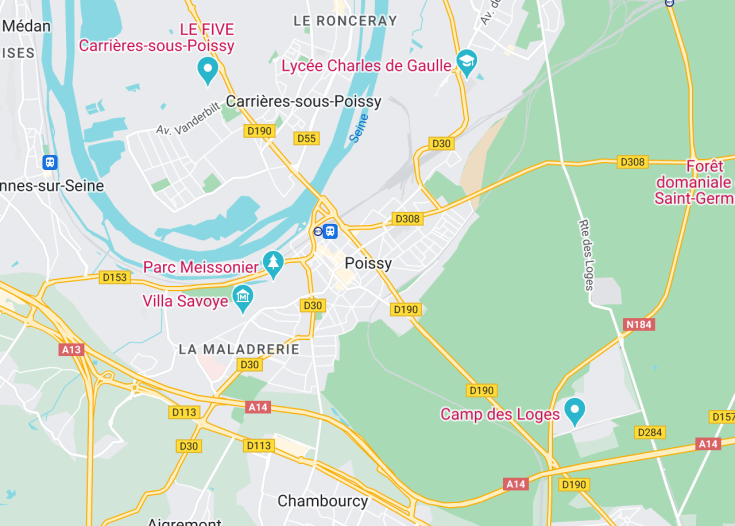Poissy, located in the Yvelines department of France, stands out with its rich history and vibrant culture. This charming town is famed for the Romanesque Poissy Collegiate Church, once the baptismal place of King Louis IX. The town is also renowned for Villa Savoye, designed by the architect Le Corbusier, which exemplifies modernist architecture. Poissy’s scenic location along the River Seine offers visitors delightful walking paths, while its historic town center features a variety of shops and traditional French cafes, making it a perfect blend of history and modernity.
Explore the Musee du Jouet during your visit to appreciate an extensive collection of toys dating back to the 1850s, showcasing French cultural heritage and craftsmanship.
Consider timing your visit with the Fete de la Saint Louis in late August, where you can immerse yourself in local traditions and enjoy varied cultural events.
Top things to do & see in Poissy
Select the following sights and activities to discover best tickets and tours available in Poissy.
Poissy: Gateway to French History and Culture
| Country | France |
| Time in Poissy | GMT+1 |
| Language spoken | French |
| Population | 37,461 (source: INSEE) |
| Currency | Euro (€, EUR) |
| Airports |
|
Located in the Yvelines department in the Île-de-France region, Poissy is a significant town known for its rich history and vibrant culture. Situated about 23 kilometers northwest of Paris, Poissy is nestled on the banks of the Seine river, making it a picturesque destination. The town is historically renowned for hosting the birthplace of King Louis IX, commonly known as Saint Louis, whose reign marked numerous justice reforms and architectural achievements.
One of the architectural gems in Poissy is the Villa Savoye designed by Le Corbusier, which is now a designated UNESCO World Heritage Site. This iconic building exemplifies the International style and is often studied by architects and students globally. Poissy’s charm is enriched by its old town area, which features narrow, cobblestone streets lined with traditional French cafes and boutiques that give a glimpse into the town’s medieval past.
Economically, Poissy is also an industrial hub, primarily noted for its automobile manufacturing unit – the Peugeot factory, which has been operational since 1940 and remains a critical part of the town’s industry. Additionally, Poissy’s cultural fabric is woven with vibrant festivals like the Poissy Jazz Festival, which attracts artists and spectators from across the region.
With its proximity to Paris, Poissy serves as a tranquil yet vibrant commuting town that offers a blend of historical richness and modern amenities, making it a preferred residential area for those who work in Paris but prefer the calmness of suburban life. Its educational facilities, recreational areas, and active civic community contribute significantly to its quality of life, thus preserving its heritage while continually adapting to contemporary needs.
Where is Poissy?
Nestled on the banks of the River Seine, Poissy is strategically located in the Île-de-France region, a short drive from the heart of Paris.
| Route | Distance by car | Time by car |
|---|---|---|
| Paris to Poissy | 24 km | 40 min |
| Versailles to Poissy | 21 km | 30 min |
| Rouen to Poissy | 112 km | 90 min |
What is Poissy famous for?
Poissy is famed for its architectural marvel, the Villa Savoye, designed by Le Corbusier, and its historical significance as the birthplace of Saint Louis.
History
Prehistoric to Medieval Times
Poissy’s history traces back to prehistoric times where the area was primarily inhabited by hunter-gatherer communities. The site was later settled by the Gauls, evidenced by various archaeological finds. The official foundation of Poissy, however, dates back to the early medieval period. The town was an important religious center, home to the Priory of St. Louis, named after King Louis IX who was born here in 1214. Notably, Poissy also hosted significant ecclesiastical synods in the 12th century.
14th Century to French Revolution
Throughout the Middle Ages, Poissy enjoyed prominence, facilitated by the establishment of the Royal Abbey, which attracted pilgrims and royalty. The town was fortified during the 14th century, a testament to its strategic importance. By the time of the Renaissance, Poissy developed as a market hub, particularly noted for its leather and tanning industries. However, like many French towns, Poissy was impacted by the Revolution, experiencing socio-economic upheavals and destruction of some religious institutions.
19th Century to Modern Day
The 19th century heralded industrial growth, marking the beginning of modern industrial Poissy. The town’s proximity to Paris facilitated its development into a manufacturing hub, especially famous for the Simca automobile factory established in the 1930s. Today, Poissy is recognized for its blend of historical heritage and modernity, maintaining its medieval core while expanding with contemporary suburban developments. Additionally, its cultural and educational institutions continue to make Poissy a significant locale in the landscape of France’s Yvelines department.
Visit Poissy
What to see and do in Poissy, France
Poissy offers a rich tapestry of historical and contemporary attractions. Key landmarks include the Villa Savoye designed by Le Corbusier, now a UNESCO World Heritage site, which represents a cornerstone of modern architectural history. The Collegiate Church of Notre-Dame, dating back to the 12th century, is another must-see for its gothic architecture and historical significance.
- Explore the Toy Museum (Musée du Jouet), showcasing toys from various periods, a delight for all ages.
- Stroll along the Seine for picturesque views and serene walks.
- Visit the Poissy Market, a vibrant local market perfect for discovering local gastronomy and crafts.
Festivals and Events in Poissy
Poissy’s cultural calendar is dotted with various annual events worth planning your visit around. The Poissy Jazz Festival in June brings together celebrated artists and emerging talents. In September, the city celebrates its rich history during the Médiévales de Poissy, a weekend of medieval-themed festivities including markets, workshops, and performances set in historical locations around the town.
Best time to visit Poissy
The ideal time to visit Poissy is between late spring and early autumn, particularly from May to September, when the weather is pleasant, allowing for extensive outdoor exploration and participation in local events.
Is Poissy worth visiting?
Poissy offers a compelling blend of historic charm and modern culture making it a worthwhile destination for a day trip or a longer stay. Visitors can enjoy a variety of sights from ancient religious edifices and historic residential architecture to modern marvels like the Villa Savoye. However, those seeking a bustling city atmosphere might find Poissy quieter than expected, but its tranquility and historic depth are precisely its appeal. Potential challenges include limited nightlife and entertainment options but, overall, for lovers of history and architecture, Poissy holds substantial allure.










